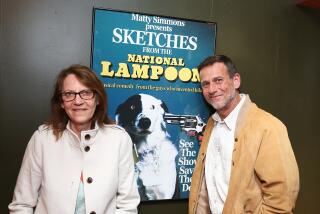A Pair of Jazz Guitar Greats Pay Tribute to Their Mentor : Music: Joe Pass and John Pisano will team up at Elario’s to sing the praises of Django Reinhardt, a seminal influence on their careers.
- Share via
SAN DIEGO — For budding jazz guitarists, the 1963 album “For Django” is anessential primer.
Sparks fly as guitarists Joe Pass and John Pisano work their way through several of the late, great jazz guitarist Django Reinhardt’s signature tunes. Their rapport is similarly electric on “Summer Nights,” a second Reinhardt tribute released last year.
The pair, with a new album out under Pass’ name (“Appassionato”) featuring Pass with Pisano, will team for a tribute to Reinhardt on Wednesday through Sunday nights at Elario’s.
The son of French Gypsy parents, Reinhardt, along with Charlie Christian and a few others, practically reinvented the guitar as a lead jazz-band instrument during the late 1930s and early 1940s.
Reinhardt’s contribution was all the more remarkable because of his physical handicap. At 18, Reinhardt burned his left hand in a fire, leaving only two fingers available for fret work, but he nevertheless left a legacy of complex, nimble solos and dozens of original compositions when he died in 1953 at the age of 43.
“If you talk to any guitar player of our vintage, Django was probably one of our biggest influences,” said Pisano, 60, who, as a teen-ager, saw Reinhardt perform with Duke Ellington’s band.
“As a guitarist, you try to play some of that stuff Django did with two fingers, and it’s pretty amazing, it’s not easy to do, even with all four fingers.
“Harmonically, Charlie Christian was more advanced, he was the beginning of the be-bop era.
“Everybody said there were people like Eddie Lang and others before Django that played single-line stuff, but he was the first with the facility to play these amazing lines. His technique was extraordinary.”
The single lines Pisano refers to were improvised progressions of single notes, rendered with the spare, melodic quality of a fine jazz vocalist or saxophonist. When jazz guitarists went electric during the 1940s, Reinhardt’s singing approach was often copied.
Pass, too, is revered among jazz players for his phenomenal prowess on guitar, his knack for revitalizing even the most rundown jazz standards into marvelous monuments through his harmonic and melodic inventions.
In this band, Pisano--a studio veteran, former member of Herb Alpert’s Tijuana Brass and co-leader of the Latin jazz band Velas--takes a background role as rhythm guitarist, a job he relishes.
“Joe says I have to stretch out a little on this gig, but I wouldn’t even think of trying to match him,” Pisano said. “Technically, he’s got all the chops. His sense of harmony and the way he plays everything just moves the right way, all of the resolutions within the chords are very satisfying.
“As far as accompanying him, I try to give him the right support, or an occasional kick in the pants--not that he needs it. There’s a lot to be said about accompanying. For some reason, I have a knack for it.
“You really have to listen to what the other artist is doing and complement him. If he plays a line, you don’t duplicate it, you enhance, follow, support him along the way. It’s something you do through listening and really being with him, as opposed to doing your own thing.”
Pisano lives in Studio City with his longtime girlfriend, singer and vocal coach Jeanne Moore. He met Pass (who keeps homes in L.A. and Hamburg, Germany) in 1962, and the two have collaborated on several recordings besides the two Reinhardt tributes and the new Pass album.
One of these was a mid-1960s collection of popular rock tunes, including the Beatles’ “Michelle” and the Rolling Stones’ “Paint It Black,” a short-lived record-company experiment designed to broaden Pass’ and Pisano’s following among teens.
Another collaboration titled “Whitestone,” released two years ago, features Pass and Pisano against a lighter, contemporary jazz backdrop than the straight-ahead jazz Pass is known for. Because of poor promotions and distribution, “Whitestone” didn’t make much of a splash either.
Still, with his reputation as a sensitive accompanist, Pisano is in steady demand.
He made a new recording with pianist Clare Fischer two weeks ago (due for release early next year) and he plays on “Unforgettable,” singer Natalie Cole’s top-selling tribute to her father, Nat King Cole.
Pass’ new release, “Appassionato,” teams Pass and Pisano with bassist Jim Hughart and drummer Colin Bailey--the same lineup as on the Reinhardt tributes. Material on Pass’ new album ranges from standards such as “Relaxin’ at the Camarillo,” “Body and Soul” and “You’re Driving Me Crazy” to more obscure numbers like Dizzy Gillespie’s “That’s Earl, Brother.”
This same group, with top L.A. bassist Monty Budwig replacing Hughart, will be reunited at Elario’s. But the shows will focus primarily on material from the Reinhardt tribute albums, including such Reinhardt originals as “Nuages,” “Anouman,” “Douce Ambience,” “Belleville,” “Tears” and “Limehouse Blues,” and tunes by others onto which Reinhardt practically carved his initials, such as Earl Hines’ “Rosetta” and Cole Porter’s “Night and Day.”
The San Diego dates will be a tuneup for the Pass/Pisano band’s December tour of Japan, which will include stops at Blue Note jazz nightclubs in Tokyo, Osaka and Fukuoka.
More to Read
The biggest entertainment stories
Get our big stories about Hollywood, film, television, music, arts, culture and more right in your inbox as soon as they publish.
You may occasionally receive promotional content from the Los Angeles Times.









